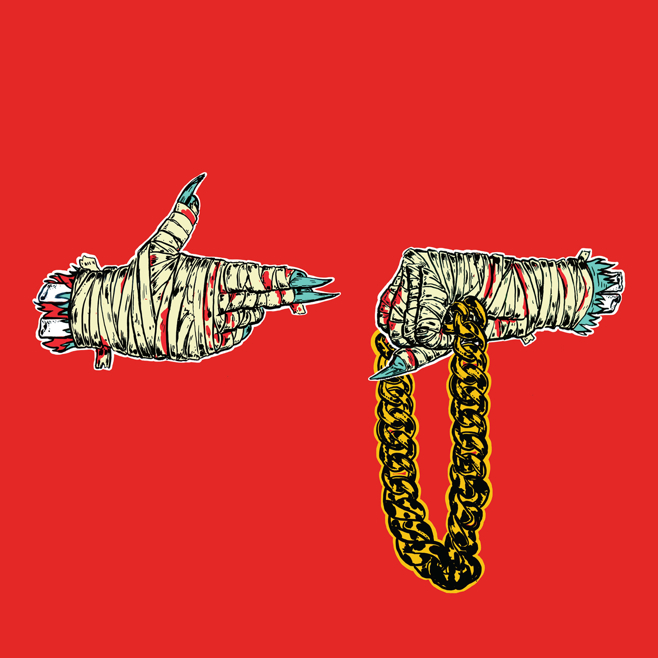The voice of the youth: Political activism and music
“These are the future leaders of the world!” Atlanta-based MC Killer Mike of Run the Jewels shouts into pulsing crowd of American University students. He’s met with a swell of screaming applause. Before him is a sea of raised hands, all holding up an imitation of the group’s logo, forming imaginary pistols with one hand and balled fists with the other. Multicolored lights flash, the DJ scratches a record to punctuate the remark.
The mass of students huddled around the makeshift stage in the center of the Tavern on March 27. Run the Jewels, a rap duo composed of veteran MCs Killer Mike and El-P, captivated the audience, who danced and stumbled in post-pre-game bliss.
“This is some institution you’ve got here,” adds El-P. “When you go back to your dorm tonight, instead of writing sad poetry about how hard college is, write a thank you letter to mommy and daddy for sending you here.” He makes the universal hand gesture for money, rubbing his middle finger and thumb together as if he were folding a crisp hundred-dollar bill.
Then the group launched into their song “Lie, Cheat, Steal” . The crowd joined in on the song’s to-the-point refrain.
“Lie. Cheat. Steal. Kill. Win. Come on, everybody’s doing it.”
If these lyrics are any indicator, the pair is skeptical of the powerful and successful. El-P has stated that the band’s only ideology is anti-hypocrisy, whether it be in government, media, or the rap game. Following this credo, they’ve mastered the art of riding the fence between a party-starter and a protest hymn.
The group doesn’t shy away from uncomfortable issues. This year, they released a music video that candidly dealt with racially fueled police brutality. Lyrically, they’ve addressed the issue more directly than many of their contemporaries. They’ve also been vocal supporters of the #BlackLivesMatter movement, which spurred nationwide discussion and action, even on our own campus.
Killer Mike’s politics have been in the spotlight in the past year more than ever. His insights on race in America have been in high demand since the events of Ferguson. A day prior to Run the Jewel’s performance, he published a well-researched op-ed for Vox about rap lyrics being used as admissible evidence in court cases, remarking on our nation’s history of legally silencing black speech. He’s even taken to the college speaking circuit, imploring students to engage in activism that affects their communities.
So perhaps calling AU students the “future leaders of the world” wasn’t meant as praise. It doesn’t seem like Mike or El-P thinks highly of our world’s current stock of leaders. Perhaps it was more of a challenge to those with the power to reshape the status quo to go forth and do just that. Perhaps it was meant to hold up a mirror: to make a captive audience reconsider their place and potential.
The group’s choices of subject matter and Mike’s activism pedigree make Run the Jewels seem like the perfect fit for AU. Most of Run the Jewels’ performances ride the fence between a block party and a populist rally. The school regularly tops Princeton Review’s list of the most politically active campuses in the country, and activism is almost a rite of passage.
Activism and music have always enjoyed a complex relationship. Artists with a political bent often have to balance intrigue and insight, trying to entertain their audience without completely compromising their stance.
Rap, in particular, walks this tightrope. It’s a genre that grew up in dancehalls with roots in improvisation in showmanship. It has dealt with the politics of race in America more frankly than any other form of music. The past year has seen a renaissance in critically acclaimed hip-hop artists making timely and relevant political commentary, which has coincided with a broader national discussion.
Run the Jewels aren’t the first to pair catchy music with lyrical manifestos. Nor are they the first to take this kind of music to college campuses (SUB’s last performer, Lupe Fiasco, comes to mind). What sets them apart is their ability to provoke dance and thought simultaneously.
Above all else, El-P and Killer Mike are talented craftsmen. They had an electricity that the three foot barrier between audience and stage could not contain. If they were holding back more pointed commentary, their act didn’t suffer for it.
They managed to squeeze inspiration between the breakbeats. Their message was one of empowerment and excitement for the future.
“Right now, the world is run by old, white, pedophile warmongers” El-P declared, to a room half-ecstatic and half stunned-silent. “But you know what [they] do? They die. And then who gets to take over?”
He turns his microphone to the crowd, and the future leaders of the world thunderously applaud.












